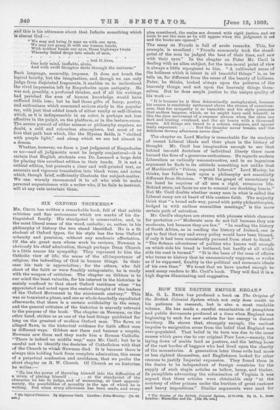SIX OXFORD THINKERS.*
Mn. CECIL has written a remarkable book, full of that subtle criticism and fine seriousness which are marks of his dis- tinguished family. His standpoint is conservative, and, in the most liberal sense of the word, catholic; or, rather, in his philosophy of history the two stand identified. He is a fit student of Oxford types, for his style has the true Oxford
urbanity and precision, without any academic affectation. Of the six great men whose work he reviews, Newman is
obviously his chief admiration, though perhaps Dean Church is a little nearer his sympathy. They represent to him the Catholic view of life, the sense of tho all-importance of religion, the indwelling of God in human things. In their case his task is appreciation ; for the others, who fell short of the faith or were frankly antagonistic, he is ready with the weapon of criticism. The chapter on Gibbon is to our mind the least valuable, for his interest in the historian is mainly confined to that short Oxford residence when "he appreciated and acted upon the central thought of the leaders of the Oxford Movement in the nineteenth century." This was so transient a phase, and one so whole-heartedly repudiated afterwards, that there is a certain artificiality in the essay, and the general criticism of the historian is scarcely relevant to the purpose of the book. The chapter on Newman, on the other hand, strikes us as one of the beat things published for long on the greatest of modern Oxford men. The flaws, or alleged flaws, in the historical evidence for faith affect men in different ways. Gibbon saw them and became a sceptic, Newman saw them and they made him a Roman Catholic. "There is indeed no middle way," says Mr. Cecil; but he is careful not to identify the doctrine of Catholicism with that of the Church in which Newman died. It is because there is always this holding back from complete admiration, this sense of a perpetual confession and avoidance, that we prefer the short chapter on R. W. Church. Of Church as an historian he writes :— "He has the power of throwing himself into the difficulties of
a crisis, of placing himself at the standpoint of the character he has to judge, and of measuring, at least approxi- mately, the possibilities of morality in the age of which he is writing. But when every allowance has been made, and every
Sits Oxford Thinkers. By Algernon Ceoil. Londoni John Murray, pa. ed. net,' plea considered, the scales are dressed with rigid justice, and we seem to see the man as he will appear when the judgment is set and the books are opened."
The essay on Fronde is full of acute remarks. This, for example, is excellent " Proud° commonly took the stand- point of the men he judged the best of their time, and saw with their eyes." In the chapter on Pater Mr. Cecil is dealing with an alien subject, for the non-moral point of view is always a little repugnant to him. "A cultivated sense of the holiness which is latent in all beautiful things" is, as he. tells us, far different from the sense of the beauty of holiness. Pater, he thinks, looked always upon the patterns of the heavenly things, and not upon the heavenly things them- selves. But he does ample justice to the unique quality of his work :—
" It is because he is thus determinedly metaphysical, because his reason is resolutely enthroned above the stream of conscious- ness, that his sympathy is so immobile and his style possesses that endless languor, which, as he might have said himself, is like the slow movement of a summer stream when the skies are dark and louring overhead, and the air heavy with a thousand scents. All things are tuned to a solemn suspense, and appear lazily expectant But the thunder never breaks, and the. delicious drowsy afternoon never dies."
The chapter on Lord Morley is remarkable for its analysis of recent Liberal ideals and their place in the history of thought. Mr. Cecil has imagination enough to see that behind ice.cold doctrines of individual liberty there once. burned the fires of a generous enthusiasm. He regards modern Liberalism as radically unconstructive, and in an ingenious. argument he finds in its attitude something not unlike that of Machiavelli's "Prince, reputed Liberal." Lord Morley, he thinks, has fallen back upon a philosophy not essentially different from Stoicism. "With the gospel of uncertainty in his band he requires of all men a rigid, strenuous life.
Behind stern, set faces we are to conceal our doubting hearts.' But Mr. Cecil doubts whether many men in what is called the Liberal camp are at heart of this austere faith. The majority think that "a broad safe way, paved with petty philanthropies, hedged in with endless committee meetings," is the more certain path of salvation.
Mr. Cecil's chapters are strewn with phrases which clamour for quotation :—" Moderate men do not fail because they are moderate, but because they are few." "In reading the history of South Africa, as in reading the history of Ireland, one is. apt to feel that any and every policy would have been blessed,. if only it bad been consistently pursued from start to finish." "The flotsam adventurer of politics who knows well enough, on which side his bread is buttered, but hardly at all which side his coat is turned." "It is the bane of the man of affairs. who turns to history that he unconsciously supposes, or works as if be supposed, finality in the political and economic ideals. of his own time." We trust that we have quoted enough to-
send many readers to Mr. Cecil's book. They will find it in a. high degree illuminating and suggestive.










































 Previous page
Previous page